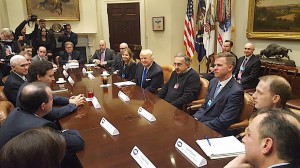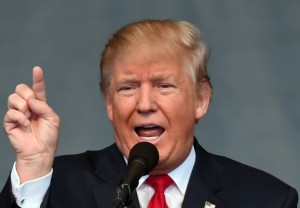
President Donald Trump, center, met with the CEOs of Ford, General Motors and Fiat Chrysler to discuss jobs.
Both sides appear to be still looking for a deal in the wake of President Donald Trump’s meeting with the CEOs of Detroit’s automakers.
Trump staked out his position in advance of the meeting, tweeting “I want new plants to be built here for cars sold here!” The automakers want less regulation and lower taxes, but don’t want their trade with Mexico or other countries disrupted.
Trump apparently opened the meeting with GM CEO Mary Barra, Ford CEO Mark Fields and Fiat Chrysler CEO Sergio Marchionne by re-emphasizing the point made in his tweet.
“We have a very big push on to have auto plants and other plants – many other plants,” he told reporters. “It’s happening,” he added.
In return for new plants, Trump offered to make a big push on regulations and taxes to make it more attractive for businesses to operate in the United States. Trump specifically mentioned making it much easier to get the permits needed to build a greenfield plant built, but the Trump administration is also thought to be considering rolling back the fuel-economy regulations imposed by the Obama Administration and checking those imposed by the State of California.
Auto executives emerged from the meeting, saying they were pleased, but made no specific promises.
Following a meeting today at the White House, Marchionne reiterated that Trump’s desire to build a strong manufacturing base in the United States is a common goal shared by FCA US.
(Trump to meet with Detroit Three CEOs today. For more, Click Here.)
“I appreciate the President’s focus on making the U.S. a great place to do business. We look forward to working with President Trump and members of Congress to strengthen American manufacturing.”
In total, FCA US has committed investments of more than $9.6 billion in its U.S. manufacturing facilities and created 25,000 new jobs to date since 2009, he noted.
“We had a very constructive and wide-ranging discussion about how we can work together on policies that support a strong and competitive economy and auto industry, one that supports the environment and safety,” Barra said.
“The U.S. is our home market and we are eager to come together to reinvigorate U.S. manufacturing. We all want a vibrant U.S. manufacturing base that is competitive globally and that grows jobs. It’s good for our employees, our dealers, our suppliers and our customers.”
Ford CEO Mark Fields also met with Trump on Monday as part of another group of executives that included Tesla’s Elon Musk. In today’s meeting, Fields planned to discuss corporate tax reform, the need for “data-driven regulations” and trade policy initiatives that address foreign currency manipulation, Ford spokeswoman said.
GM, Ford and Fiat Chrysler have all said in response to prodding by Trump that they plan to add new jobs and investments in the United States. However, all three companies are also making major capital expenditures in Mexico, which Trump has threatened with a border tax.
(For more on the Trans-Pacific Partnership announcement, Click Here.)
GM in 2014 said it would invest $5 billion in Mexico through 2018, a move that would allow it to double its production capacity — and Barra has said the automaker is not reconsidering the plan.
GM and Ford also committed to new investment in Canada under a new labor agreement signed last fall with Unifor, the union representing Canadian autoworkers employed by Detroit’s automakers.
The Center Automotive Research also noted in a recent study that the North American auto industry has become highly integrated since NAFTA took hold in the mid-1990s and undoing the integration could drive up costs to consumers and wipe out 31,000 jobs.
Earlier this month Ford did scuttle plans to build a $1.6 billion plant in Mexico and instead invest $700 million in a factory in Michigan; however, the maker is still planning to move production of Focus small cars to Mexico from Michigan, which will require additional investment at an existing plant in Hermosillo, Mexico.
FCA is also launching a Jeep vehicle this month at a plant in Mexico for export to the U.S.
Tuesday’s gathering was the first time the CEOs of the Big Three automakers have met jointly with a U.S. president since a 2011 session with Barack Obama to tout a deal to nearly double fuel efficiency standards by 2025.
(Trump threatens Canada, Mexico, with new border tariffs. Click Here for the story.)
While automakers are adding U.S. jobs they are also cutting U.S. small car production. On Monday, GM ended two shifts of production of small cars in Ohio and Michigan, cutting about 2,000 jobs.

